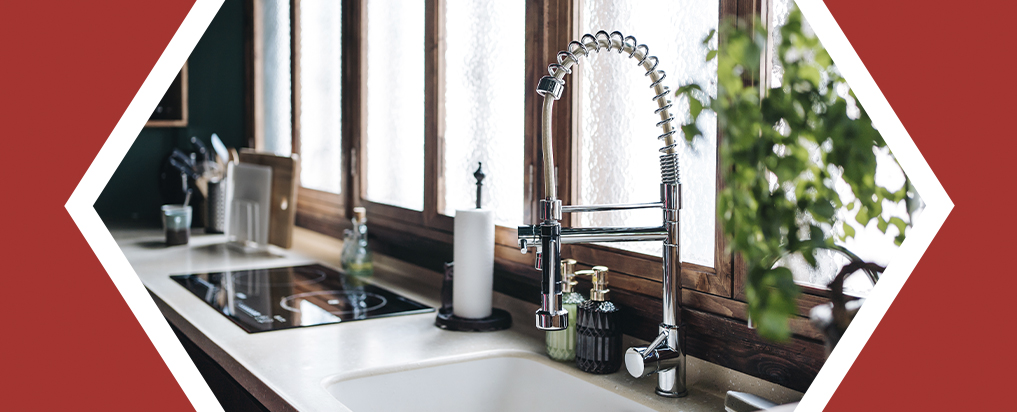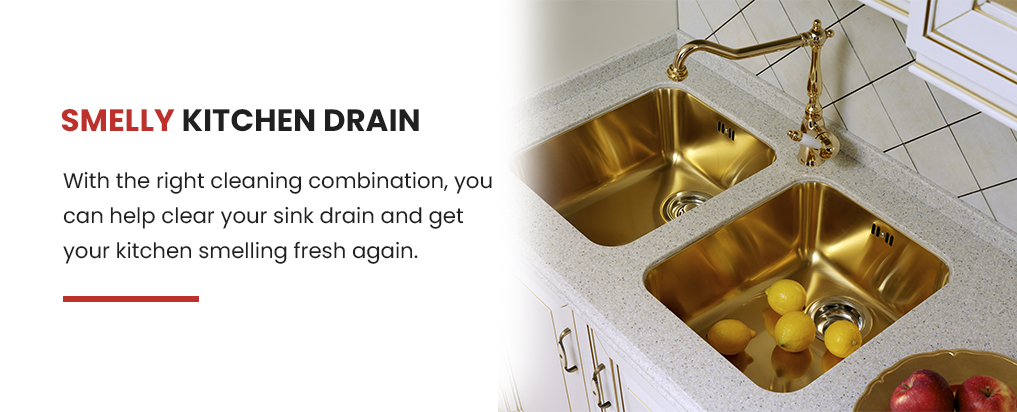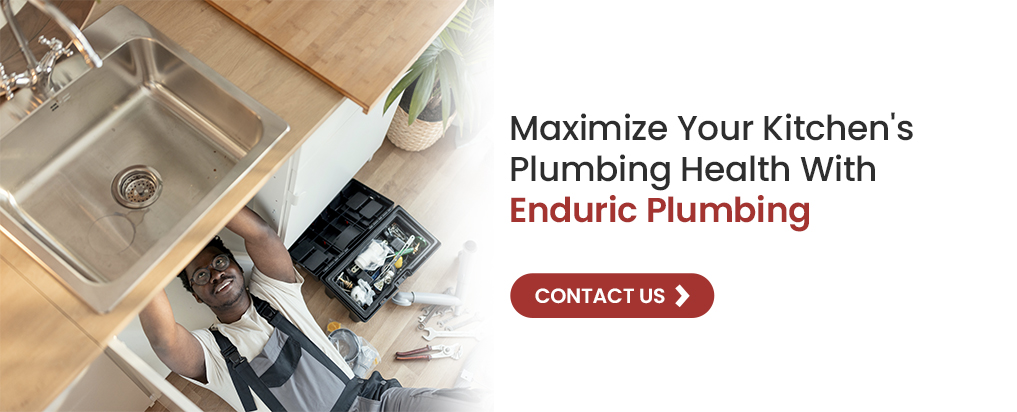
June 24, 2024
Many people will have to deal with a smelly kitchen sink at some point. Trying to get the smells out can be challenging if you aren’t sure of the cause. Understanding what causes kitchen sink smells and how to clean them out will help you take care of your plumbing and prevent musty smells. Use these tips to help keep your kitchen fresh and efficient all year.
Why Does My Kitchen Sink Smell?
Having a smelly kitchen can make your home uncomfortable. Getting to the root of the problem is key for households dealing with smelly sinks. If you can find the cause of your smelly kitchen sink drain, you can stop it from happening again. Let’s look at four main reasons you’re dealing with a smelly kitchen sink drain.
Mold and Mildew
Mold and mildew start to smell when they’re allowed to spread. These issues love damp environments — your sink is the perfect home for them. When water and food sit in your drain, it lets mold and mildew form. Once they start growing, they spread quickly until you’ve got a smelly sink. If you notice musty, unpleasant smells coming from your kitchen sink, it could be mold or mildew. Investing in sink cleaning can help eliminate this problem and keep the smells at bay.
Food Particles and Grease Buildup
While it’s good practice to try to keep food and grease out of your sink, sometimes they still manage to get into your drains. Too much food and grease buildup will lead to foul odors. Once leftover scraps make their way into the pipes, they start to decompose. With food decomposition comes bacteria and unpleasant smells. Grease will go down as a liquid but will eventually become a solid. Solid grease blocks the sink and traps smells, creating an even stronger odor when combined with decomposing food. Regular sink cleaning and flushing will help break down those deposits and reduce smells.
Bacterial Growth
Bacteria will also cause odors in your kitchen. Warm, moist air is ideal for bacteria. Add in some food particles, and you’ll have the perfect environment for bacteria to multiply. Bacteria produce foul-smelling gases that can create the kitchen odor you’re smelling. Disinfecting your sink regularly with an antibacterial cleaner can help you beat bacteria and the smells they come with.
Plumbing Issues
Finally, while your plumbing helps carry water and debris away, it might also be the source of your sink smells. Clogged or damaged pipes and traps can trap food particles. This buildup will lead to unpleasant smells that make it hard to stay in your kitchen. Additionally, improperly vented plumbing systems can sometimes cause sewer gases to escape through the sink drain. These gases will leave your kitchen sink smelling musty, even if you clean it regularly. Regular plumbing maintenance and inspections are essential for preventing these problems.

How to Clean a Smelly Kitchen Drain
If you’re fighting a smelly sink drain, you might have to try different methods to see success. With the right cleaning combination, you can help clear your sink drain and get your kitchen smelling fresh again. Here are some cleaning methods to help you fix your smelly kitchen drain and keep your home smelling clean:
- Hot water and soap: This is the easiest starting point. Boil a pot of water and pour it down the drain. The hot water helps loosen debris and flush it away. After pouring the water, put up to 1 cup of dish soap down the drain. Give the soap a few minutes to break down everything in the pipes, then flush the drain with more boiling water.
- Baking soda and vinegar: Pour 1 cup of baking soda down the drain, and then pour 1 cup of white vinegar down after it. The chemical reaction between these two products creates a foam that helps break down and dislodge your sink debris. Leave the mixture for at least 15 minutes before flushing your drain with hot water. This is a great option if you want to avoid flushing harsh cleaning chemicals down the drain.
- Ice and powder cleaner: This method is for anyone with a garbage disposal. Take a few ice cubes and drop them into your disposal. Put some sink-safe powder cleaner or powder dish detergent in there, too. Run some cold water down the drain and start your garbage disposal. The ice will help clean your disposal blades, while the powder cleaner will help clean the sink and eliminate odors.
- Plunger: If you’re dealing with a tougher clog, you might have to break out the plunger. Put the plunger over the drain hole and fill your sink up with water until it covers the plunger’s head. You’ll create a seal, making your plunging more effective. Plunge your sink for at least 30 seconds. Your plunger will create enough suction and pressure to dislodge major blockages and clear your sink. Once you’ve successfully plunged the sink, put hot water down the drain to clear it out.
Tips to Keep Your Sink Smelling Fresh
Cleaning a smelly kitchen sink drain can be unpleasant. If you want to avoid those odors in your sink, use these tips to keep your kitchen fresh-smelling:
- Remember proper waste disposal: Be selective about what you put down your sink. Avoid putting grease, food scraps and oils down your drain — these can lead to odors and clogs. You can use a sink strainer to catch any solid debris. Throw your debris into the trash or compost to prevent sink blockages.
- Freshen it up occasionally: Every week, pour a cup of vinegar or some soap and hot water down your drain. If you have a garbage disposal, run it with sink-safe powder cleaner. An occasional refresh will keep your sink smelling good in between deep cleanings.
- Keep a regular cleaning schedule: Establish a routine for cleaning your sink out using the cleaning steps above or a professional service. Regular cleaning helps keep bacteria, mold and odors from building up. Cleaning your sink once a week is best, but monthly cleaning can still keep odors from becoming problematic.
- Get professional plumbing maintenance: While these cleaning methods will help prevent smells, you should also get regular plumbing maintenance. A professional will inspect your pipes, identify potential issues and perform a deep clean that gets into your system. These professional services do work you can’t necessarily do yourself, helping your kitchen sink stay in good condition. Professional maintenance helps catch unseen problems, improving your plumbing’s long-term health and efficiency.
Maximize Your Kitchen’s Plumbing Health With Enduric Plumbing
Drain buildup, improper plumbing and sudden damage can all lead to kitchen sink smells and poor performance. If you want to get your kitchen drain clean and keep it that way, contact the experts at Enduric Plumbing Services for help. Our comprehensive residential plumbing services include drain unclogging and sink cleaning, helping you beat those kitchen smells. With our preventative plumbing maintenance services, you can invest in regular plumbing care for better efficiency and a longer life span. Contact us online for expert plumbing services today!



